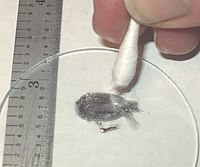
Photo from wikipedia
Abstract Minichannel heat sinks are widely adopted heat dissipation solutions from miniaturized heat flux generating components, such as microprocessors. This paper presents further enhancements in the thermal and hydraulic performance… Click to show full abstract
Abstract Minichannel heat sinks are widely adopted heat dissipation solutions from miniaturized heat flux generating components, such as microprocessors. This paper presents further enhancements in the thermal and hydraulic performance of a minichannel heat sink by employing supercritical carbon dioxide (sCO2) as a coolant. In this study, thermal and hydraulic performance of CO2-cooled minichannel heat sink at three inlet pressures ( P i n , C O 2 ) (i.e., 8.0, 10 and 12 MPa ) and inlet temperatures ( T i n , C O 2 ) ranging between 30 ∘ C − 60 ∘ C is compared with a water-cooled minichannel heat sink at inlet conditions ( 0.1 MPa , 30 °C − 38 °C ) . To investigate the performance of the minichannel heat sinks, a conjugate heat transfer model is solved in a commercial code ANSYS-CFX. Whereas the variations in thermo-physical properties of supercritical carbon dioxide (sCO2) are incorporated in ANSYS-CFX through a real gas property (RGP) table. The results reveal a maximum enhancement of 42.13% in average heat transfer coefficient ( h ¯ ) for minichannel heat sink using CO2 as a coolant at inlet conditions of 8.0 MPa and 34 ∘ C . Similarly, a pressure drop reduction of 55.79% is computed for CO2 as a coolant at corresponding inlet conditions as compared to water-cooled minichannel heat sink. Moreover, the results suggest that replacing water with CO2 as a coolant at higher inlet pressures ( P i n , C O 2 ) i.e., 10 MPa and 12 MPa can further reduce pressure drops in the minichannel heat sink by 60.65% and 62.41%, respectively. Apart from the lower base temperatures, performance evaluation criteria ( P E C ) suggests that the overall performance of the minichannel heat sink using CO2 at 8.0 MPa is roughly enhanced by 2 times as compared to water-cooled minichannel heat sink.
Journal Title: International Journal of Heat and Mass Transfer
Year Published: 2021
Link to full text (if available)
Share on Social Media: Sign Up to like & get
recommendations!